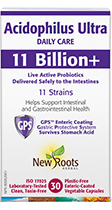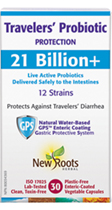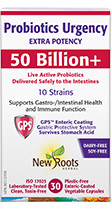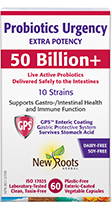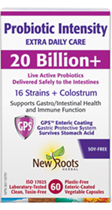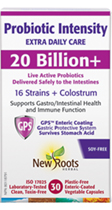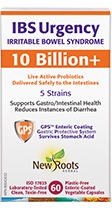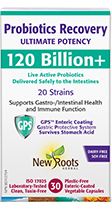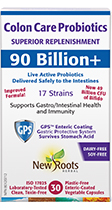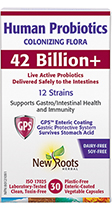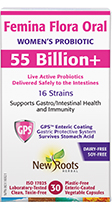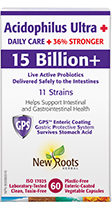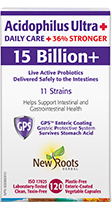Probiotics: The Microbiome, Our Internal Garden
Have you ever thought about your poop and what all of the bacteria inside your intestines do? Our bodies are loaded with bacteria, notably good bacteria that live in symbiotic relationship with us. We actually depend on them! But really, what do they do and why are they so important?
Our Flora is Crucial Right from the Beginning
The human microbiota is the collective of all microorganisms that live on and within us. Our microbe composition is established in the first moments of our lives, by contact with our mother’s vaginal flora. Children born vaginally receive this seedling of colonizing bacteria, which help develop their immune systems. Many moms having C-sections are now looking to do “vaginal seeding,” a process in which a swab collects vaginal fluids to transfer vaginal flora to the mouth, nose, and skin of their newborn infant. Skin-to-skin contact is also an important way to transfer microflora from parents and caregivers to infants. Babies who are breast-fed receive a great amount of their mom’s flora versus babies who are bottle/formula-fed. Research shows that children born by C-section have a much higher chance of developing asthma, inflammatory bowel disease, juvenile arthritis, and obesity later in life.[1] Shocking, right? Similar consequences are seen in children who were not breast-fed or who used antibiotics frequently, predisposing them to many health concerns in the future.
Later, our microbiota depends on our diet, our stress management, our environment, our lifestyle, and on events such as infections and antibiotic use.
What You Eat Balances Your GI for Better Health
“Dysbiosis” is a term that naturopathic doctors use to describe any imbalance in the microflora. Research shows that a diet rich in fat and red meat changes the composition of bacteria, promoting the growth of certain species,[2] whereas diets that are primarily plant-based have a predominance of other groups of bacteria. A diet high in sugars and refined carbohydrates promotes the growth of yeasts—such as Candida—creating another type of dysbiosis.[3] These changes can create problems in the digestive system, which is also responsible for an important part of our immune function. The digestive system being rich in nerves, notable effects may be observed on the nervous system following a dysbiosis, especially with our mood and how we feel.
Probiotics as supplements and fermented foods can help restore balance in the intestinal flora. Prebiotics are another way to support the microflora. They are a group of fibres that provide food for the microorganisms to grow and flourish.
 Probiotics for Strong Immunity
Probiotics for Strong Immunity
With regards to immune function, many of the Lactobacillus bacteria have shown helpful actions. Some can stick to intestinal-wall cells, helping to protect this barrier from invaders. They block pathogens and help remove them along the intestinal tract.[4] Some bacteria produce chemicals that are bactericidal, such as hydrogen peroxide, which prevent pathogen growth and keep the “local community” in check.[5] L. rhamnosus, L. reuteri, L. casei, and heat-treated L. acidophilus were helpful at treating rotavirus and other intestinal-tract infections;[6] and S. boulardii and L. rhamnosus improved watery and antibiotic-associated diarrhea.[7] Overall, a variety of bacterial strains are important because they often communicate with each other and have different roles.[8]
There has been a lot of research on probiotics and allergies, asthma, and respiratory conditions. The Bifidobacteria, which are high in breast-fed infants, were shown to suppress IgE,[9] an immunoglobulin involved in allergies. Mixtures of L. acidophilus, L. plantarum, B. infantis, and B. bifidum have shown improvements in allergic symptoms and wheezing.[10], [11], [12] The role of probiotics in modifying the immune response make them useful in vaccination,[13], [14] food allergies, and immune-type skin conditions such as psoriasis and eczema.[15], [16], [17]
Your Microflora Is Precious to Prevent Autoimmune Diseases
Because of these immune-modulating properties, research has branched out to autoimmune diseases. In celiac disease, research has found decreases in both Lactobacillus and Bifidobacteria species, showing a disregulation. Probiotics are incredibly helpful for inflammation, showing improvements in many inflammatory markers such as cytokines and CRP (a blood marker for inflammation). Bacteria such as L. casei and Bacillus coagulans were helpful in conditions such as rheumatoid arthritis and type 1 diabetes.[18], [19], [20] In Crohn’s disease and ulcerative colitis, there seems to be a decrease in certain short-chain fatty acids (SCFAs) produced by colonic bacteria. These SCFAs play a role in the homeostasis of the colon, have anti-inflammatory effects, and help move waste along.[21] Changes in diet can improve the bacteria colonies that produce SCFAs. Increasing certain fibres and prebiotics such as fructooligosaccharides (FOS) and galactooligosaccharies (GOS) can be helpful, but their worsening of symptoms has also been reported.[22] Seeing a naturopathic doctor is crucial for a specific treatment plan and choosing the right probiotic and nutritional combination. Digestive and autoimmune concerns are often complex, involving not only the digestive tract but also the mental-emotional state of the person.
 Healthy Bugs for a Happy Life
Healthy Bugs for a Happy Life
Another benefit of probiotics is supporting mental-emotional balance, calling the bacteria “psychobiotics” in this case. It’s a fascinating new area of research looking at the microbial-gut-brain axis, or how the microbiome affects the brain. As we know, many neurotransmitters and important messengers communicating with the nervous system are produced in abundance in the digestive tract. For instance, probiotics have shown effects on tryptophan levels and on GABA, among others. L. plantarum, L. rhamnosus, L. casei Shirota, and B. bifidum are now known to bring improvements in depression, cognitive function, mood, stress, and anxiety.[23], [24], [25], [26], [27] Sleep was also significantly improved in a few studies on probiotics.[28], [29] Autism symptoms are closely related to dysbiosis and gastrointestinal disturbances, and probiotics play many roles in improving symptoms such as social behaviour.[30], [31]
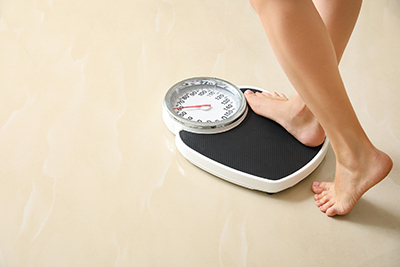 Other Benefits of Probiotics: Cardiovascular Health and Weight Management
Other Benefits of Probiotics: Cardiovascular Health and Weight Management
Metabolic syndrome involves a dysregulation of blood sugar, cholesterol, abdominal fat, and blood pressure, as well as an increased risk of cardiovascular diseases including type 2 diabetes. A considerable amount of research shows that probiotics have an effect on cholesterol levels, blood sugar, and especially obesity.[32], [33], [34] L. acidophilus, L. plantarum, and L. reuteri were most often associated with positive changes in cholesterol.[35] Weight reduction and decreases in body mass index (BMI) were benefited with L. rhamnosus, L. grasseri,[36], [37], [38] as well as the beneficial yeast S. boulardii.[39] Other research showed that prebiotics, such as GOS, decreased inflammatory markers and could lower the risk of cardiovascular disease.[40]
Probiotics are live microorganisms that positively benefit a person. There are very low risks or side effects of supplementation, and food sources are also therapeutic. Prebiotic fibres feed and help support the growth of these probiotics and are easy and cheap to manufacture. When looking for good quality supplements of probiotics,
- multistrain formulas show better support than single-strain products;
- enteric coating should be considered to ensure bacteria make it to the intestines; and
- refrigeration is necessary for viability of most of the conventional strains, especially bifidobacteria.
Just like in nature, everything works in symbiotic relationship, and we must respect the balance. Would you have thought that probiotics could not only fortify your immune system, but could help you lose weight, protect your cardiovascular system, and support your mood and sleep? Preserving and restoring these friendly bacteria by supplementation and diet is necessary for optimal health.
Let’s keep our internal garden flourishing!
 Dr. Krista Mackay, BSc, ND
Dr. Krista Mackay, BSc, ND
Krista practices both in Montreal, Quebec, and Montevideo, Uruguay. A busy mom of two boys, she focuses on naturopathic general/family medicine, helping to find a reasonable balance to optimal wellbeing and stress management, including nutrition, herbal medicine, and mind-body work.
kristamackay.ca
[1] Rinninella, E., P. Raoul, M. Cintoni, F. Franceschi, G.A. Donato Miggiano, A. Gasbarrini, and M.C. Mele. “What is the healthy gut microbiota composition? Changing ecosystem across age, environment, diet, and diseases.” Microorganisms, Vol. 7, No. 1 (2019): 14.
[2] Gagliardi, A., V. Tonito, F. Cacciotti, V. Iebba, B. Neroni, G. Bonfiglio, M. Trancassini, C. Passariello, F. Pantanella, and S. Schippa. “Rebuilding the gut microbiota ecosystem.” International Journal of Environmental Research and Public Health, Vol. 15, No. 8 (Aug 2018): 1679.
[3] Gagliardi et al, “Rebuilding the gut microbiota ecosystem.”
[4] Foster, L.M., T.A” Tompkins, and W.J. Dahl. “A comprehensive post-market review of studies on a probiotic product containing Lactobacillus helveticus R0052 and Lactobacillus rhamnosus R0011.” Beneficial Microbes, Vol. 2, No. 4 (2011): 319–334.
[5] Khalighi A, et al. “Probiotics: A comprehensive review of their classification, mode of action and role in human nutrition.” Chapter 2 (p. 19–39) in: Rao, V., and L. Rao, eds. Probiotics and Prebiotics in Human Nutrition and Health. London: IntechOpen, 2016, 394 p.
[6] Liévin-Le Moal, V., and A.L. Servin. “The front line of enteric host defense against unwelcome intrusion of harmful microorganisms: Mucins, antimicrobial peptides, and microbiota.” Clinical Microbiology Reviews, Vol. 19, No. 2 (2006): 315–337.
[7] Markowiak, P., and K. Śliżewska. “Effects of probiotics, prebiotics, and synbiotics on human health.” Nutrients, Vol. 9, No. 9 (2017): 1021.
[8] Chapman, C.M.C., G.R. Gibson, and I. Rowland. “In vitro evaluation of single- and multi-strain probiotics: Inter-species inhibition between probiotic strains, and inhibition of pathogens.” Anaerobe, Vol. 18, No. 4 (2012): 405–413.
[9] Gagliardi et al. “Rebuilding the gut microbiota ecosystem.”
[10] Kerry, R.G., J.K. Patra, S. Gouda, Y. Park, H.-S. Shin, and G. Das. “Benefaction of probiotics for human health: A review.” Journal of Food and Drug Analysis, Vol. 26, No. 3 (2018): 927–939.
[11] Miraglia Del Giudice, M., C. Indolfi, M. Capasso, N. Maiello, F. Decimo, and G. Ciprandi. “Bifidobacterium mixture (B longum BB536, B infantis M-63, B breve M-16V) treatment in children with seasonal allergic rhinitis and intermittent asthma.” Italian Journal of Pediatrics, Vol. 43, No. 1 (2017): 25.
[12] Stojković, A., A. Simović, Z. Bogdanović, D. Banković, and M. Poskurica. “Clinical trial/experimental study (consort compliant): Optimal time period to achieve the effects on synbiotic-controlled wheezing and respiratory infections in young children.” Serbian Archives of Medicine, Vol. 144, No. 1–2 (2016): 38–45.
[13] Lei W.-T., P.-C. Shih, S.-J. Liu, C.-Y. Lin, and T.-L. Yeh. “Effect of probiotics and prebiotics on immune response to influenza vaccination in adults: A systematic review and meta-analysis of randomized controlled trials.” Nutrients, Vol. 9, No. 11 (2017): 1175.
[14] Simon, E., L.F. Călinoiu, L. Mitrea, and D.C. Vodnar. “Probiotics, prebiotics, and synbiotics: Implications and beneficial effects against irritable bowel syndrome.” Nutrients, Vol. 13, No. 6 (2021): 2112.
[15] Khalighi et al, “Probiotics: A comprehensive review.”
[16] Davani-Davari, D., M. Negahdaripour, I. Karimzadeh, M. Seifan, M. Mohkam, S.J. Masoumi, A. Berenjian, and Y. Ghasemi. “Prebiotics: Definition, types, sources, mechanisms, and clinical applications.” Foods, Vol. 8, No. 3 (2009): 92.
[17] Woo, S.-I., J.-Y. Kim, Y.-J. Lee, N.-S. Kim, and Y.-S. Hahn. “Effect of Lactobacillus sakei supplementation in children with atopic eczema-dermatitis syndrome.” Annals of Allergy, Asthma & Immunology, Vol. 104, No. 4 (2010): 343–348.
[18] Zamani, B., H.R. Golkar, S. Farshbaf, M. Emadi-Baygi, M. Tajabadi-Ebrahimi, P. Jafari, R. Akhavan, M. Taghizadeh, M.R. Memarzadeh, and Z. Asemi. “Clinical and metabolic response to probiotic supplementation in patients with rheumatoid arthritis: A randomized, double-blind, placebo-controlled trial.” International Journal of Rheumatic Diseases, Vol. 19, No. 9 (2016): 869–879
[19] Vaghef-Mehrabany, E., B. Alipour, A. Homayouni-Rad, S.-K. Sharif, M. Asghari-Jafarabadum and S. Zavvari. “Probiotic supplementation improves inflammatory status in patients with rheumatoid arthritis.” Nutrition, Vol. 30, No. 4 (2014): 430–435.
[20] Mandel, D.R., K. Eichas, and J. Holmes. “Bacillus coagulans: A viable adjunct therapy for relieving symptoms of rheumatoid arthritis according to a randomized, controlled trial.” BMC Complementary and Alternative Medicine, Vol. 10 (2010): 1.
[21] Kerry et al, “Benefaction of probiotics for human health.”
[22] Simon et al, “Probiotics, prebiotics, and synbiotics.”
[23] Reis, D.J., S.S. Ilardi, and S.E.W. Punt. “The anxiolytic effect of probiotics: A systematic review and meta-analysis of the clinical and preclinical literature.” PLoS One, Vol. 13, No. 6 (2018): e0199041.
[24] Rudzki, L. L. Ostrowska, D. Pawlak, A. Małus, K. Pawlak, N. Waszkiewicz, and A. Szulc. “Probiotic Lactobacillus plantarum 299v decreases kynurenine concentration and improves cognitive functions in patients with major depression: A double-blind, randomized, placebo controlled study.” Psychoneuroendocrinology, Vol. 100 (2019): 213–222.
[25] Akkasheh, G., Z. Kashani-Poor, M. Tajabadi-Ebrahimi, P. Jafari, H. Akbari, M. Taghizadeh, M.R. Memarzadeh, Z. Asemi, and A. Esmaillzadeh. “Clinical and metabolic response to probiotic administration in patients with major depressive disorder: A randomized, double-blind, placebo-controlled trial.” Nutrition, Vol. 32, No. 3 (2016): 315–320.
[26] Mohammadi, A.A., S. Jazayeri, K. Khosravi-Darani, Z. Solati, N. Mohammadpour, Z. Asemi, Z. Adab, et al. “The effects of probiotics on mental health and hypothalamic-pituitary-adrenal axis: A randomized, double-blind, placebo-controlled trial in petrochemical workers.” Nutritional Neuroscience, Vol. 19, No. 9 (Nov 2016): 387–395.
[27] Steenbergen, L., R. Sellaro, S. van Hemert, J.A. Bosch, and L.S. Colzato. “A randomized controlled trial to test the effect of multispecies probiotics on cognitive reactivity to sad mood.” Brain, Behavior, and Immunity, Vol. 48 (2015): 258–264.
[28] Nishida, K., D. Sawada, Y. Kuwano, H. Tanaka, and K. Rokutan. “Health benefits of Lactobacillus gasseri CP2305 tablets in young adults exposed to chronic stress: A randomized, double-blind, placebo-controlled study.” Nutrients, Vol. 11, No. 8 (2019): 1859.
[29] Takada, M., K. Nishida, Y. Gondo, H. Kikuchi Hayakawa, H. Ishikawa, K. Suda, M. Kawai, et al. “Beneficial effects of Lactobacillus casei strain Shirota on academic stress-induced sleep disturbance in healthy adults: A double-blind, randomised, placebo-controlled trial.” Beneficial Microbes, Vol. 8, No. 2 (2017): 153–162.
[30] Barbosa, R.S.D., and M.A. Vieira-Coehlo. “Probiotics and prebiotics: Focus on psychiatric disorders—A systematic review.” Nutrition Reviews, Vol. 78, No. 6 (2020): 437–450.
[31] Vuong, H.E., and E.Y. Hsiao. “Emerging roles for the gut microbiome in autism spectrum disorder.” Biological Psychiatry, Vol. 81, No. 5 (2017): 411–423.
[32] Hu, Y.-M., F. Zhou, Y. Yuan, and Y.-C. Xu. “Effects of probiotics supplement in patients with type 2 diabetes mellitus: A meta-analysis of randomized trials” [article in English and Spanish]. Medicina Clínica, Vol. 148, No. 8 (2017): 362–370.
[33] Kocsis, T., B. Molnár, D. Németh, P. Hegyi, Z. Szakács, A. Bálint, A. Garami, A. Soós, K. Márta, and M. Solymár. “Probiotics have beneficial metabolic effects in patients with type 2 diabetes mellitus: A meta-analysis of randomized clinical trials.” Scientific Reports, Vol. 16, No. 1 (2020): 11787.
[34] Bordalo Tonucci, L., K.M. Olbrich Dos Santos, L. Licursi de Oliveira, S.M. Rocha Ribeiro, and H.S. Duarte Martino. “Clinical application of probiotics in type 2 diabetes mellitus: A randomized, double-blind, placebo-controlled study.” Clinical Nutrition, Vol. 36, No. 1 (2017): 85–92.
[35] Guo, Z., X.M. Liu, Q.X. Zhang, Z. Shen, F.W. Tian, H. Zhang, Z.H. Sun, H.P. Zhang, and W. Chen. “Influence of consumption of probiotics on the plasma lipid profile: a meta-analysis of randomised controlled trials.” Nutrition, Metabolism and Cardiovascular Diseases, Vol. 21, No. 11 (2011): 844–850.
[36] Kerry et al, “Benefaction of probiotics for human health.”
[37] Ferrarese, R., E.R. Ceresola, A. Preti, and F. Canducci. “Probiotics, prebiotics and synbiotics for weight loss and metabolic syndrome in the microbiome era.” European Review for Medical and Pharmacological Sciences, Vol. 22, No. 21 (2018): 7588–7605.
[38] Sanchez, M., C. Darimont, S. Panahi, V. Drapeau, A. Marette, V.H. Taylor, J. Doré, and A. Tremblay. “Effects of a diet-based weight-reducing program with probiotic supplementation on satiety efficiency, eating behaviour traits, and psychosocial behaviours in obese individuals.” Nutrients, Vol. 9, No. 3 (2017): 284.
[39] Rondanelli, M., N. Miraglia, P. Putignano, I. Castagliuolo, P. Brun, S. Dall’Acqua, G. Peroni, et al. “Effects of 60-day Saccharomyces boulardii and superoxide dismutase supplementation on body composition, hunger sensation, pro/antioxidant ratio, inflammation and hormonal lipo-metabolic biomarkers in obese adults: A double-blind, placebo-controlled trial.” Nutrients, Vol. 13, No. 2512 (2021): 2512.
[40] Davani-Davari et al, “Prebiotics: Definition, types, sources, mechanisms, and clinical applications.”

 Stores
Stores
